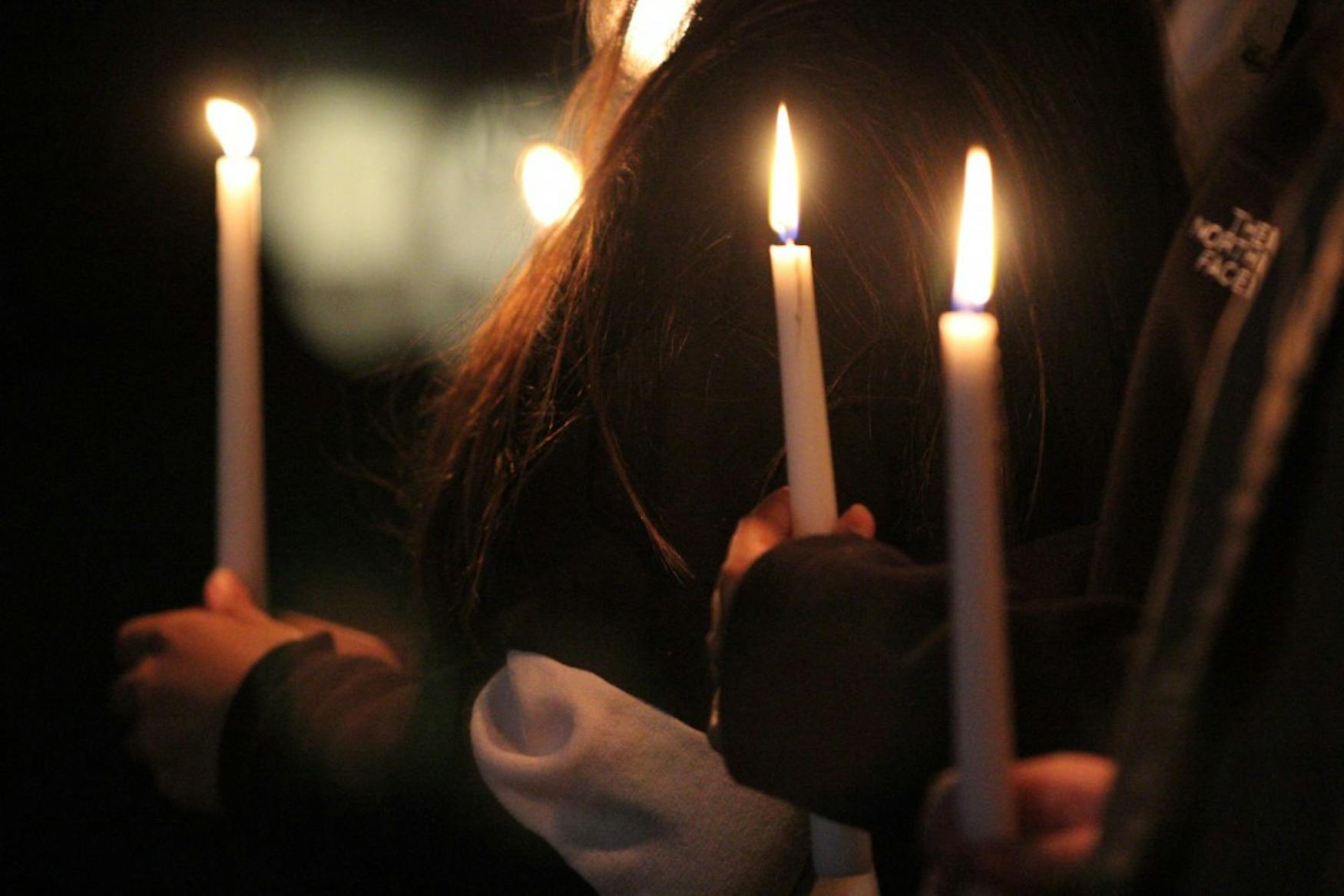University community marches for awareness in "Take Back the Night"
On Tuesday night, community members gathered on Rabb steps for a cross-campus march focused on discussing and eliminating sexual and domestic violence, titled “Take Back the Night.” The event was sponsored by Students Talking About Relationships, the Brandeis Feminist Majority Leadership Alliance and the Brandeis Rape Crisis Center.
Take Back the Night is a non-profit organization and an international event that began in Europe and came to the United States in the late 1960s, according to the organization’s website. The University has held “Take Back the Night” walks on campus since 2005.
“Since the 1970s in the United States, TBTN has focused on eliminating sexual and domestic violence in all forms,” the website reads in its description of the organization. “Thousands of colleges, domestic violence shelters, and rape crisis centers have held events all over the country.”
At the top of Rabb steps, participants were given lit candles as student coordinators and administrators spoke to the crowd of more than a hundred. In attendance were Dean of Students Jamele Adams, Senior Vice President for Students and Enrollment Andrew Flagel, Sexual Assault Services and Prevention Specialist Sheila McMahon, Provost Lisa Lynch and Assistant Dean of Students and Director of Student Activities Stephanie Grimes. To begin the march, student leaders of STAR, FMLA and the RCC explained to the crowd that the walk would take them through all the quads, ending on the Great Lawn in front of the Shapiro Campus Center. During the stops in each of the quads, the circle would be open for anyone who wanted to share stories about themselves or others or present statistics on sexual violence, the students said.
Next, a few of the administrators in attendance addressed the crowd, discussing both the importance of the march and noting the various resources available to students, including the Rape Crisis Center and the Psychological Counseling Center, among others.
“Taking back the night is where we take action, where we take back power over fear and a lot of other things associated with sexual assault,” Lynch said. “This is a special evening. Let’s take back some power.”
“We walk both in solidarity with the survivors of sexual assault and some of us as victims of sexual assault,” McMahon said.
Student leaders then instructed the crowd to chant, “Stop the violence, keep the fight, we are stronger, take back the night,” as they made their way to North Quad. Once the group was standing in the middle of the quad, they yelled, “Hey North Quad, take back the night,” three times.
Several students stepped up to share stories of their own past experiences with sexual violence and the impact it has left on them. “What worries me is that he still walks around campus, preying for another victim,” one student said.
Others spoke of “institutional betrayal” during the investigation and hearing processes, discussing how they felt the University did not support them and help them as it should have. Specifically, many students mentioned that their attackers were able to remain on campus and have their verdicts overturned through the appeals process.
In East Quad, more students addressed the crowd with statistics and accounts of sexual violence.
One student told of being raped at a party during her freshman year. She described remaining silent for several years, unable to discuss her experience.
For years, she said, she dismissed the sexual assault with jokes and suffered alone, subsequently feeling like she was not allowed to seek help when she decided to share her story. Of this experience, she stated, she learned that every victim has a right to ask for help at any time.
“Silence does not make you ineligible to seek support and help,” she said.
Another student described feeling disconnected after her experience with sexual violence. “I long for the day I can express genuine happiness,” she said. “When will I feel like myself again?”
The crowd chanted, “Shatter the silence, stop the violence,” and, “The culture needs to change and it needs to change now” as it marched through Rosenthal Quad and Massell Quad, respectively.
At the end of the night, McMahon addressed the crowd, likening being the victim of sexual violence to being stuck in winter, “being cold and in the dark [and] fearful and alone.”
“Remember that regardless of how cold and dark the winter inside of us may make us feel … that spring always comes,” McMahon said. “When we stand together, violence cannot live.”




Please note All comments are eligible for publication in The Justice.